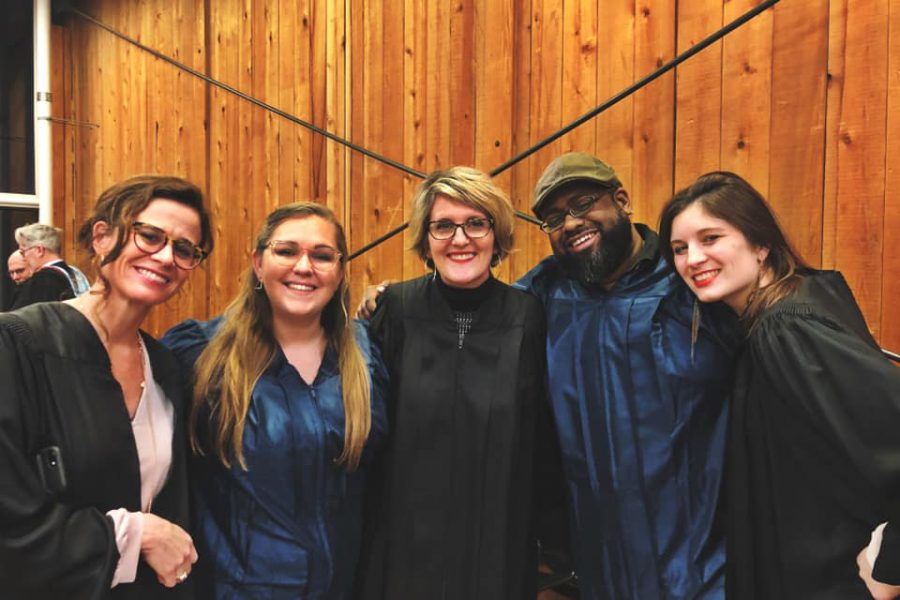
When I was accepted into the Bennington Writing Seminars now a little over two years ago, the Associate Director told me the program would change my life. I didn’t believe her. It seemed to me that that term, “life-changing,” gets thrown around a bit too much. But now, two years later and having just graduated with my Masters of Fine Arts with a concentration in Fiction, I have to admit that she was right. The past two years have been some of the most challenging, frustrating, inspiring, and rewarding I have yet to experience.
Each January and June for the past two years I’ve driven the three hours south to Bennington College for a ten-day intensive residency, jam-packed with ~12 hours each day of lectures, master classes, workshops, and readings (not to mention karaoke, trivia, and dance parties to unwind after a long day being immersed in literature). These residencies were as invigorating as they were, at times, overwhelming. I relished being around other writers and getting to discuss books and literature all day long. Though these residencies were exhausting, they also sustained me through long months of writing alone in my loft. They gave me a community of writers with whom to share my frustrations and successes. For the six months between residencies, I wrote and read. A lot. Each month I read at least 5 books (often more), wrote annotations on two of them, and wrote (And edited. And deleted. And rewrote.) 20-30 pages of fiction and mailed it to my professor. Each semester, I got to work with one of my favorite writers, corresponding about what I was reading and working on, receiving thoughtful feedback about my work. These exchanges guided me in new directions and helped me feel more confident as a writer.
Here are a few of the (many) lessons I took away from the Bennington Writing Seminars:
- “Always go to a surprising place.” -Claire Vaye Watkins (Battleborn, Gold Fame Citrus)
Allow your work to surprise you and embrace the unexpected. As Robert Frost said, “No surprise for the writer, no surprise for the reader.” - “Specificity is the enemy of the cliche.” -Stuart Nadler (Wise Men, The Inseparables, Book of Life)
The details your character notices says more about that character than it does about the details themselves. Be as specific as possible. - Find the punctum (the “small, distinct point” of focus) in your story. -Deirdre McNamer (Red Rover, My Russian, One Sweet Quarrel, etc.)
- “Always make it worse.” – Alice Mattison (Conscience, When We Argued All Night, In Case We’re Separated, etc.)
Take your story to the extreme. Don’t hold back on emotions. Then scale back if you need to. - Write about your obsessions.
- Dig in deeper to the moments you want to turn away from. That’s where the real story is.
- Write often. Write through your frustrations. Give yourself permission to write badly; just write. As our commencement speaker, Garth Greenwell (What Belongs to You), said, “The only form of failure is not writing.”
I’ve learned more over the past two years than I could ever summarize here. Most importantly, I’ve learned to take risks, to be confident in my work, and to be bold. This has, at times, been scary, but ultimately so rewarding. Last week, I stood up in front of a lecture hall full of students and faculty and talked about representations of mentally ill women in fiction (giving a thirty-minute lecture is part of the BWS graduating requirements, along with giving a twenty minute reading of your creative work). In that lecture, I did something scary for me – I talked about my own struggles with mental health. The responses were overwhelmingly positive, supportive, and grateful. That experience was a challenge I’m so glad I embraced. I felt particularly privileged to be able to share my work alongside some of the most talented and encouraging people I know (see photo above – I’m on the right, pictured with a few members of my graduating class). My classmates’ lectures spanned topics from the influence of poets writing about the AIDS epidemic to the roles of mothers in black literature, obsession to handwriting, feminist identities to the use of time in fiction. I am in awe of the work my classmates have done in the past two years and look forward to reading more of their work in the future.
As part of BWS’ Graduate Teaching Fellowship, I was also able to teach two sessions with local high school Burr & Burton Academy’s creative writing class last week. The students were enthusiastic, and eager to learn and share their work. We talked about story structure, what makes something a story, and looked at some examples of work that push the boundaries of what stories can do. I found working with these young people inspiring and encouraging. This experience was a good reminder of how much I love talking about writing with writers at all stages of their lives.
Undertaking this program was, for me, a leap of faith in myself and my writing. It helped me put the things I love most – books, reading, writing, and talking about literature – at the forefront of my life. It taught me to be brave and pursue my passions with my whole self. In short, the Associate Director was right; this program changed my life.
Erika Nichols-Frazer is a writer and reader who lives in Watisfield, VT. She is the Communications Manager of the Children’s Literacy Foundation and a recent graduate of the Bennington Writing Seminars’ Master of Fine Arts program. She is currently working on a short story collection.



